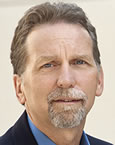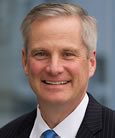| Can Democracy Meet the Challenge of Polarization? |

Mark Chupp, Ph.D. - Assistant Professor, Jack, Joseph and Morton Mandel School of Social Sciences at Case Western Reserve University |

Lee Weingart - President, LNE Group |
Friday November 18, 2016
12:30-1:30 p.m.
Dampeer Room
Kelvin Smith Library
Case Western Reserve University
Dear Colleagues:
For nearly two decades, political scientists and other commentators have observed growing “polarization” in U.S. politics. That means people gravitating into two groups, far apart and repelling each other, trying to conquer rather than compromise. Some analysts claimed the general public was much less polarized than the political activists and elites. Others said that didn’t matter much, as the result was the same either way – and, over the years, the claim that polarization did not represent the public has become less and less true. The election looks like evidence that the divide has deepened and widened.
If democratic or representative government requires that people move from conflict to compromise, how can it survive severe divisions? There is no easy answer, but we can start by discussing situations in which divisions are bridged or worked around. Mark Chupp and Lee Weingart have done so in very different ways. Professor Chupp works on transformation of intergroup conflict in places such as El Salvador and Nicaragua. Former Cuyahoga County Commissioner Weingart advocates for clients across partisan lines even as those lines have become harder to cross. Join us as we think about whether their different experiences offer any lessons, or hope, for the future.
All best regards,
Joe White
Luxenberg Family Professor of Public Policy and Director, Center for Policy Studies
About Our Guests
Mark G. Chupp is Assistant Professor at the Mandel School of Applied Social Sciences of Case Western Reserve University and serves as Chair of the Concentration in Community Practice for Social Change, and Director of the International Education Program at the Mandel School. He teaches community development and directs the East Cleveland Partnership, a multi-institutional initiative to support the revitalization of East Cleveland.
Dr. Chupp is an international consultant and trainer and has worked in Northern Ireland, Egypt, Columbia, Nicaragua, Costa Rica and El Salvador. His work has included accompanying Peace and Reconciliation Commissions during the civil ear in Nicaragua; training public officials from Croatia about citizen participation, and leadership in establishment of the Culture of Peace Program as part of an effort to create a UN Local Zone of Peace in post-war El Salvador. He has published numerous theory and practice oriented articles, manuals and book chapters. Mark is a founding trustee of the National Peace Academy and adjunct faculty at the Summer Peacebuilding Institute of Eastern Mennonite University.
Lee C. Weingart is the Founder and President of LNE Group. Since 2002, Mr. Weingart has developed LNE into a leading advocacy and lobbying firm with offices in Cleveland, Columbus, Cincinnati, Washington D.C., Berlin and Brussels. The projects on which it has worked range from helping clear the way within Congress for construction of the Meldahl Hydroelectric Facility on the Ohio River, to assisting applications to the German Federal Ministry for Education and Research for funding for refugee education in Germany.
Before founding LNE Group, Mr. Weingart served in various public and private positions. From 1995 to 1997, he served as a Cuyahoga County Commissioner. After leaving office, he held senior executive and sales positions with regional and international technology companies, including serving as chief administrative officer, vice president and general counsel of REALLOGIC. Lee is married to the former Caroline Emrick. They have three children, Lizzie, Ned and Ethan, who collectively are LNE Group’s namesake.
Where We Meet
The Friday Public Affairs Lunch convenes each Friday when classes are in session, from 12:30 p.m. to 1:30 p.m. Our programs are open to all and no registration is required. We usually meet in the Dampeer Room of Kelvin Smith Library. The Dampeer Room is on the second floor of the library. If you get off the elevators, turn right, pass the first bank of tables, and turn right again. Occasionally we need to use a different room; that will always be announced in the weekly e-mails.
Parking Possibilities
The most convenient parking is the lot underneath Severance Hall. We regret that it is not free. From that lot there is an elevator up to street level (labeled as for the Thwing Center); it is less than 50 yards from that exit to the library entrance. You can get from the Severance garage to the library without going outside. Near the entry gates - just to the right if you were driving out - there is a door into a corridor. Walk down the corridor and there will be another door. Beyond that door you'll find the entrance to an elevator which goes up to an entrance right inside the doors to Kelvin Smith Library.
Schedule of Friday Lunch Upcoming Topics and Speakers:
November 25: Thanksgiving Break.
December 2: Putin's Russia. With Kelly M. McMann, Associate Professor of Political Science and Director, International Studies Program.
December 9: Health Care Report Cards – Time for Second Thoughts? With J.B. Silvers, John R. Mannix Medical Mutual of Ohio Professor of Health Care Finance. |
|
November 14, 2016
If you would like to reply, submit items for inclusion, or not receive this weekly e-mail please send a notice to: padg@case.edu
Upcoming Events
Jordan’s Long War
A discussion with Pete Moore, Ph.D., M. A. Hanna Associate Professor of Political Science and Director of Graduate Studies in the Department of Political Science, Tuesday, November 15, 2016, 4:30 - 5:30 p.m., Clark Hall Room 206, 11130 Bellflower Road, Cleveland, Ohio 44106. Sponsored by the Baker-Nord Center for the Humanities. Free and open to the public.
Since its inception as a monarchy and a state during World War One, the Hashemite Kingdom of Jordan has participated in or been linked to nearly every major war in the Middle East. From multiple Arab-Israeli wars to civil wars and through to today’s violent conflicts in Syria and Iraq, observers have often portrayed Jordan as “surviving” or “weathering” regional conflict. In his project, Pete Moore, M. A. Hanna Associate Professor of Political Science, charts a different political history of war in the Middle East. It seeks to understand how war making and war preparation have shaped the construction of the Jordanian state and its socio-economic development.
Pete Moore's research interests focus on economic development and state-society relations in the Middle East and Africa; specifically, Gulf Arab States and Levant; business-state relations, privatization, and decentralization; sub-state conflict and regional security. Professor Moore currently serves on the Editorial Board of Middle East Report and is a member of the Northeast Ohio Consortium for Middle East Studies.
S |
M |
T |
W |
T |
F |
S |
|
|
1 |
2 |
3 |
4 |
5 |
6 |
7 |
8 |
9 |
10 |
11 |
12 |
13 |
14 |
15 |
16 |
17 |
18 |
19 |
20 |
21 |
22 |
23 |
24 |
25 |
26 |
27 |
28 |
29 |
30 |
|
|
|

|
|



